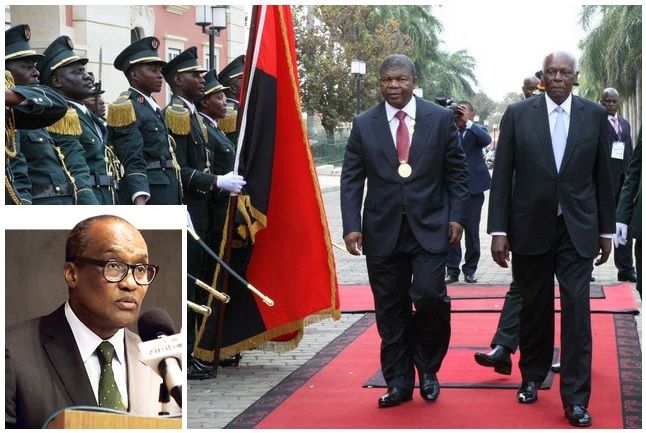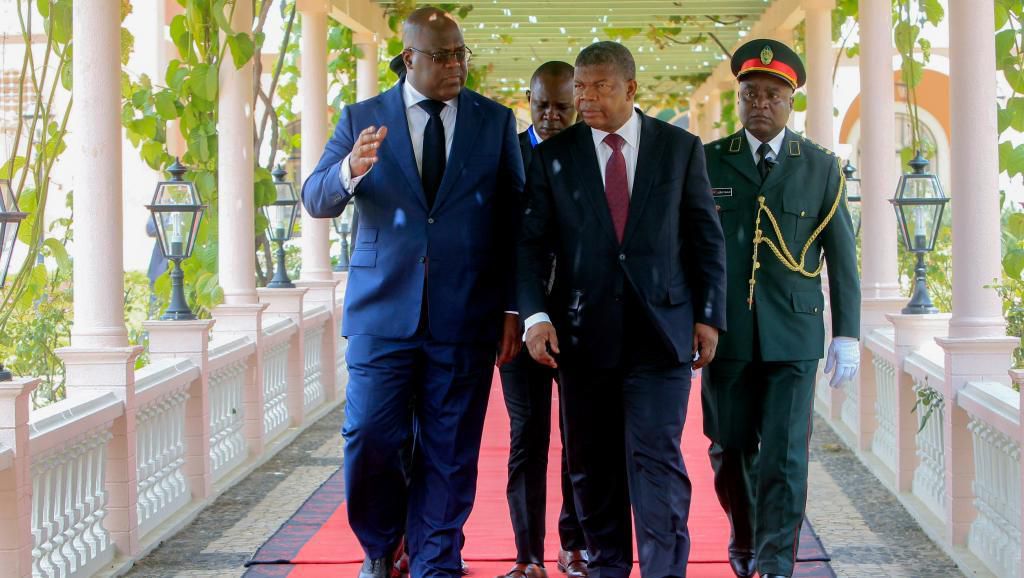ANGLOA : Le président de la République refuse d'avoir trouvé un pays pris au piège
1 Juillet 2019
INB1
INB1
Luanda - Le président de la République, João Lourenço, a refusé vendredi de trouver le pays pris au piège, mais a reconnu avoir rencontré des difficultés après avoir assumé son destin en septembre 2017.
Le président João Lourenço s'est exprimé lors d'une interview avec TPA et Novo Jornal, inaugurant ainsi une nouvelle ère dans la relation qu'il compte établir avec les médias nationaux.
"Quelqu'un a dit que j'étais le sapeur, parce que je déminaisais, d'où le piège, mais je ne le préconise pas. J'ai rencontré des difficultés, il n'y a pas de pays où il n'y a pas de difficultés, plus grandes ou plus petites, mais il faut les surmonter ", a-t-il déclaré.
Selon le Président de la République, si l’exécutif n’avait pas engagé la lutte contre la corruption, les difficultés auraient été plus grandes, réfutant l’idée d’une conduite modérée dans ce processus.
Il a rappelé que le parti au pouvoir était celui qui soutenait le gouvernement (MPLA), alors qu'il n'était qu'un candidat à la présidence de la République, qui avait chargé l'exécutif actuel de mener la lutte contre la corruption.

"Les documents constitutifs de l'époque exprimaient et soulignaient la nécessité de mener une lutte acharnée contre la corruption. Et aujourd’hui, qui sont avec moi, de manière générale, dans ce combat, ce sont les Angolais. Si une demi-douzaine de personnes ne sont pas avec moi, cela ne m’inquiète pas ", at-il déclaré.
L'homme d'État a également démenti les informations selon lesquelles les nominations effectuées à la fin du mandat de son prédécesseur auraient créé un certain inconfort.
"Je ne connais pas les nominations qui ont été faites à cette époque, mais plutôt le renouvellement des mandats, en particulier dans le domaine militaire", a-t-il déclaré.
S'agissant de la controverse entourant l'exhumation des restes du dirigeant fondateur de l'UNITA, Jonas Savimbi, le chef de l'Etat a déclaré que l'important était d'avoir trouvé une fin heureuse sur le sujet.
"Pour un processus qui a pris des mois et s'est bien terminé, 48 heures de malentendus ne veulent rien dire ...", a précisé le président, rejetant la possibilité de tirer un avantage politique du sujet.
Il a ensuite précisé qu'en aucune circonstance il n'était envisagé de traiter les funérailles de Jonas Savimbi comme des funérailles d'État, à l'instar du général Arlindo Chenda Bem Ben, ancien chef d'état-major des Forces armées angolaises (FAA).

Mais même ainsi, a-t-il dit, l'exécutif a soutenu le processus depuis le début.
Elargissement du MPLA CC
En ce qui concerne l'élargissement du Comité central du MPLA, qui est également un chef de file, a déclaré qu'il souhaitait avoir une structure engagée dans les réformes en cours dans le pays, notamment avec la lutte contre la corruption, l'impunité et la diversification de l'économie.
"Je pense qu'avec ce comité central, je suis mieux soutenu", a-t-il affirmé.
Pouvoirs constitutionnels
Le président de la République, João Lourenço, a nié avoir des pouvoirs constitutionnels excessifs et a averti que la révision de la Constitution n'était pas une loi impérative.
L'article 108 de la Constitution stipule que le Président de la République est le chef de l'État, le chef du pouvoir exécutif et le commandant en chef des forces armées angolaises.
João Lourenço a rappelé que la Constitution établissait l'existence d'organes compétents pour déclencher la révision de la loi mère.
Il a admis que la révision de la Constitution pouvait avoir lieu, mais il n'était pas obligé de le faire, car il comprenait qu'il n'y avait pas de raisons explicites.
En ce qui concerne la question de la supervision des actions de l'exécutif, a déclaré que le contrôle est effectué par le Parlement, à travers le compte général de l'État.
Hommage aux victimes du conflit
Sur ce thème, João Lourenço a mis l'accent sur le programme d'hommage aux victimes des conflits politiques dans le pays, de novembre 1975 à 2002.

Il a souligné que la construction d'un monument pour honorer ces victimes ne ferait pas taire la voix des parents du défunt.
Pour João Lourenço, "le silence des voix est ce qui a été fait toutes ces années" dans lesquelles le sujet était considéré comme tabou.
IMIM et Fonds Souverain
Le chef de l'Etat a défendu la mise en œuvre du plan d'intervention municipal intégré (PIIM), qui prévoit la construction et la réhabilitation de différentes infrastructures économiques et sociales, tout en admettant que le pays pourrait disposer d'un fonds souverain doté de moins d'argent.
Dans ce contexte, il a minimisé les opposants qui voient dans le PIIM, financé par des ressources du Fonds Souverain, des objectifs purement électoraux, affirmant que l’Angola pourrait disposer d’un fonds de moins de cinq milliards de dollars.
"PIIM" n'est pas une déclaration de fin du fonds souverain, car nous ne retirons pas toutes les ressources du fonds souverain. Par conséquent, le fonds souverain ne prend pas fin, il sera maintenu ", a rassuré le président angolais.
Il a réfuté l’idée selon laquelle l’exécutif risquait de compromettre le rendement attendu des investissements du Fonds s’il était réalisé dans des secteurs stratégiques de l’économie et non au niveau des municipalités, comme il avait été décidé avec la mise en œuvre de l’IMPI.
( ENGLISH )
Luanda - The President of the Republic, João Lourenço, rejected this Friday to have found the country trapped, but admitted to having faced difficulties after assuming the country's destiny in September 2017.
President João Lourenço spoke in an interview with TPA and Novo Jornal, inaugurating a new era in the relationship that he intends to establish with national media.
"Someone said I was the sapper, because I was demining, hence the trap, but I do not advocate it. I found difficulties, there is no country where there are no difficulties, bigger or smaller, but you have to overcome them, "he said.
According to the President of the Republic, if the Executive had not started the fight against corruption, the difficulties would have been greater, refuting the idea of having a mildness in this process.

He recalled that the ruling party was the one that supported the government (MPLA), at a time when it was only a candidate for President of the Republic, who directed the current Executive to carry out the battle against corruption.
"The governing documents at the time expressed and emphasized the need to carry out a staunch fight against corruption. And today, who is with me, in a general way in this fight, are the Angolans, if half a dozen people are not with me this does not worry me, "he said.
The statesman also denied reports that appointments made at the end of his predecessor's term would have created some discomfort.
"I do not know of appointments that were made at that time, but rather the renewal of mandates, especially in the military area," he said.
Regarding the controversy surrounding the exhumation of the remains of UNITA's founding leader, Jonas Savimbi, the Head of State said the important thing was to have found a happy ending on the subject.
"For a process that took months and had a happy ending, 48 hours of misunderstanding does not mean anything ...", clarified the President, rejecting the possibility of having a political advantage of the subject on his part.

He further clarified that under no circumstances was it considered to treat the funeral of Jonas Savimbi as a state funeral, like General Arlindo Chenda Bem Ben, former Chief of Staff of the Angolan Armed Forces (FAA).
But even so, he said, the executive supported the process from the beginning.
Enlargement of the MPLA CC
As for the enlargement of the Central Committee of the MPLA, which is also a leader, said that it sought to have a structure committed to the ongoing reforms in the country, notably with the fight against corruption, impunity and diversification of the economy.
"I believe that with this Central Committee I am better supported," he argued.
Constitutional powers
The President of the Republic, João Lourenço, denied having excessive constitutional powers and warned that revision of the Constitution is not a mandatory act.
The Constitution stipulates in Article 108 that the President of the Republic is the Head of State, the Head of the Executive Branch and the Commander-in-Chief of the Angolan Armed Forces.
João Lourenço recalled that the Constitution establishes the existence of bodies with competence to trigger the revision of the Mother Law.
He admitted that the revision of the Constitution could happen, but he was not obliged to do it, because he understood that there were no express reasons.

Regarding the issue of supervision of the actions of the Executive, said that control is done by Parliament, through the State General Account.
Homage to victims of conflict
On this theme, João Lourenço emphasized the program of homage to victims of political conflicts in the country, from November 1975 to 2002.
He emphasized that the construction of a monument to honor these victims would not silence the voices of the relatives of the deceased.
For João Lourenço "silence the voices is what has been done all these years" in which subject was considered taboo.
IMIM and Sovereign Fund
The Head of State defended the implementation of the Integrated Municipal Intervention Plan (PIIM), which provides for the construction and rehabilitation of different economic and social infrastructures, as well as admitting that the country may have a Sovereign Fund with less money.
In this context, it minimized the opposition critics who see in the PIIM, financed from resources from the Sovereign Fund, purely electoral objectives, arguing that Angola may have a fund with less than five billion dollars.
PIIM "is not a declaration of the end of the Sovereign Fund, since we are not withdrawing all the resources that the Sovereign Fund has. Therefore, the Sovereign Fund does not end, it will be maintained, "reassured the Angolan President.
He refuted the idea that the Executive risks jeopardizing the expected return on the Fund's investment if it were made in strategic sectors of the economy and not at the level of municipalities, as was now decided with the implementation of the IMPI.

/image%2F2644156%2F20230522%2Fob_8664ae_img-1834.jpeg)
/image%2F2644156%2F20190701%2Fob_f4ba52_jlo-adelmiro.jpg)
/image%2F2644156%2F20190701%2Fob_0d4a27_lourenco-angola.jpg)
/image%2F2644156%2F20190701%2Fob_3aba3c_0-27335f1f-3988-4bfe-8283-230b16a38784.jpg)
/image%2F2644156%2F20190701%2Fob_31570d_whatsapp-image-2019-06-03-at-18-27-43.jpeg)


/image%2F2644156%2F20211113%2Fob_114308_20211111-070542.jpeg)
/image%2F2644156%2F20211024%2Fob_a88d9d_images.jpeg)
/image%2F2644156%2F20211024%2Fob_db45c8_maxresdefault.jpeg)
/image%2F2644156%2F20211024%2Fob_67f655_maxresdefault.jpeg)